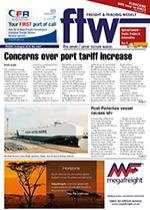Two years into the European Union-Southern African Development Community Economic Partnership Agreement (EPA), and companies are still not exploiting the quotas of duty-free exports to the EU.
By 11 July this year, duty-free quota utilization for products such as butter, skim milk powder and strawberries remained while canned tropical fruit and ethanol had only been utilized around 8% respectively.
Replacing the former SA-EU Trade, Development and Cooperation Agreement (TDCA), the EPA saw some significant increases in quotas of South African agricultural exports to the EU when the comprehensive economic partnership between the European Union and South Africa, Botswana, Lesotho, Namibia, Swaziland and Mozambique came into force in 2016.
The agreement allows for a tariff-rate quota (TRQ) of 150 000 tons of sugar exports, 80 000 tons of ethanol and 110-million litres of wine. It also granted new duty-free access on all fisheries, oranges and lemons (seasonal), cut flowers, whole milk powder, fermented milk products, whey and other natural milk products, sweetened pineapple juice, cultured yeast, dried baker’s yeast as well as non-sweetened pear juice.
New TRQs were given for skimmed milk powder, butter, sugar, citrus jams, ethanol and active yeast. “It created real new market access for South Africa into the EU,” said Trudi Hartzenberg, executive director of the Trade Law Centre (Tralac) during a seminar on the EPA in Cape Town recently.
But in 2017 only wine, citrus fruit jams and raw sugar were utilised fully while products such as refined sugar and ethanol saw utilization rates of 49% and 41% respectively. The rate for butter, frozen strawberries and skimmed milk powder was only 1%. Hartzenberg said the benefit of the agreement this year was again in the raw sugar and wine industries where the TRQ utilization was 70% and 69%.
“Also, the frozen orange juice industry is seeing a higher utilization rate at 83% and apple and pineapple juice at 78%.” Hartzenberg urged exporters to make use of the EPA and to engage with trade promotion agencies such as Wesgro to investigate potential opportunities. “When it comes to implementing an agreement such as this, the role of the private sector is critical,” she said, similarly acknowledging the challenges companies often faced when trying to access information.
“It’s not always taken as easily as it should. A small cheese exporter from Cape Town demonstrates this. The company had heard about the TRQ in November last year for a certain tonnage and duly filled in all the forms to export about five tons of cheese duty- free in 2018,” she said. “To date they have not had a response. Considering that the TRQ runs from January to December and was only published on April 26, we have to admit that this year we face some real practical issues.”


